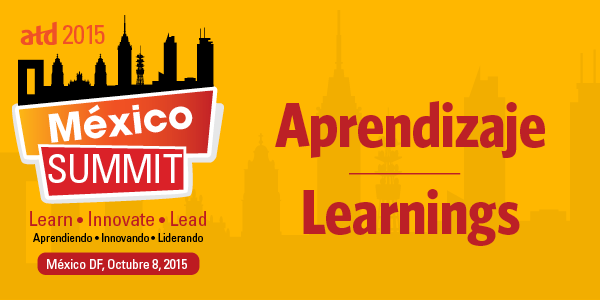ATD Blog
Learnings of ATD 2015 Mexico Summit
Mon Nov 02 2015

A panel of talent development executives shared their best practices and strategies for work-life balance, effective communication, and ROI during an informative day at ATD’s 2015 Mexico Summit in October.
One of the highlights of the session was Dominik Rus, the corporate training director for Copa Airlines in Panama, sharing his experience in introducing neuro-leadership initiatives to increase leaders’ management effectiveness. He explained that the initiatives taught leaders in both executive and supervisory roles how to achieve an acceptable level of work-life balance. For instance, outdoor walking meetings allowed participants to oxygenate their brains and exercise as they solved daily issues, planned strategies, and established new policies. This helped employees to be more effective during the workweek; they also lost weight and were generally healthier. The workforce as a whole became more eager to work, coach other employees, and partner with their teams.
Another collaboration technique came from Monica Sanchez Oviedo, the director of organizational development for TAG Pipelines in Mexico, who explained how she incorporated communication strategies at her company after learning that some of the directors and team members were getting into frequent, disruptive disagreements. She said she asked her employees to practice these new communication strategies first at home, and then at work. The new strategies allowed department heads to have conversations using standard, agreed-upon terms, so that any disagreements could be resolved diplomatically and quickly.
Metzeri Uribe, director of talent development for OPPO TMT, then shared her advice for employee engagement and retention, which are common issues in organizations worldwide. She has incorporated a competency system for performance evaluation in her organization, an approach that, in her words, “lets you map the organization’s talent, and evaluate the performance gaps and which learning and development initiatives would be appropriate for filling those gaps.” Uribe added that a biased promotion or rewards system is not only detrimental to staff morale, but also a huge loss to the organization, because it will discourage high potentials and prompt them to leave.
All the panelists said that they relied on data to achieve buy-in for new talent development initiatives and demonstrate ROI. Data that show how business goals have been achieved as a result of such initiatives are a particularly powerful metric that make it easier to implement future talent development programs.
Attendees were thrilled to have their questions answered; all appreciated an interactive session as opposed to a passive lecture or presentation. Participants were also delighted to learn that ATD will continue to offer practical Spanish-language best practices in the Mexico and Latin American regions.
